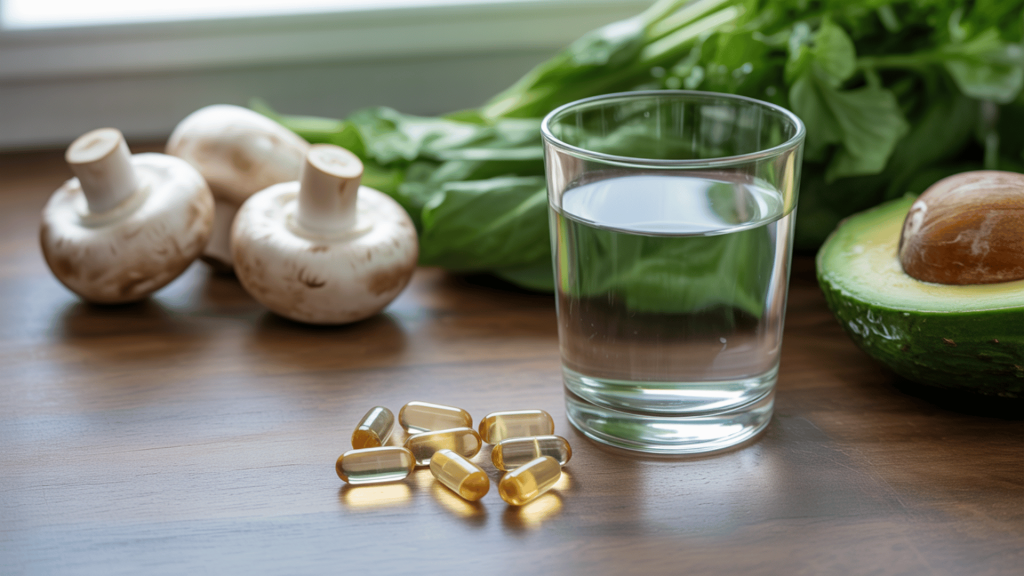I used to pop my vitamin D supplement whenever I remembered, sometimes with breakfast, other times right before bed.
If you’re like most people, you’ve probably wondered if you can take vitamin D as part of your supplement regimen. Taking vitamin D at night seems convenient, but timing can be more important than you think.
You may be surprised to learn that taking this important vitamin can impact both its effectiveness and your sleep quality.
You deserve to get the maximum benefits from your supplements without disrupting your sleep. Let me share what I know about the best timing for vitamin D supplementation.
This blog is for informational purposes only and does not constitute medical advice
What Role does Vitamin D Play in the Body?
Vitamin D functions as both a vitamin and a hormone in the human body, supporting multiple critical processes.
It primarily facilitates calcium absorption in the intestines, promoting strong bones and teeth. The nutrient also plays a vital role in immune system regulation, helping the body fight off infections and diseases.
Additionally, vitamin D supports muscle function and may influence mood regulation by interacting with brain receptors.
Research suggests it contributes to cardiovascular health and may help reduce inflammation throughout the body.
The vitamin also aids in regulating cell growth and supports the proper functioning of the nervous system, making it essential for maintaining overall health.
Common Sources of Vitamin D
Vitamin D can be obtained naturally through sunlight, certain foods, and supplements. Knowing where it comes from helps you maintain healthy levels year-round, especially if you have limited sun exposure.
| Source | Examples | Type |
|---|---|---|
| Sunlight | Direct skin exposure to UVB rays (10–30 minutes a few times per week) | Natural |
| Fatty Fish | Salmon, mackerel, sardines, tuna | Natural |
| Fortified Foods | Milk, plant-based milks, cereals, and orange juice | Artificial/Fortified |
| Egg Yolks | Eggs from chickens raised outdoors (higher levels than indoor-raised) | Natural |
| Mushrooms | Especially those exposed to UV light (e.g., maitake, portobello, shiitake) | Natural |
| Supplements | Vitamin D2 or D3 capsules, drops, gummies | Artificial |
Health Benefits of Vitamin D in the Diet

Vitamin D supplementation offers numerous health advantages that extend far beyond basic bone health.
Regular intake helps address deficiencies that are increasingly common due to limited sun exposure and dietary sources.
1. Immune System Support
The nutrient plays a crucial role in immune regulation, helping the body mount appropriate responses to infections while preventing excessive inflammatory reactions.
Research suggests that maintaining sufficient vitamin D levels may reduce the risk of respiratory infections.
2. Mood and Mental Health
Some evidence suggests that vitamin D may help alleviate seasonal depression and support overall mood regulation, particularly in individuals with documented vitamin D deficiencies.
Adequate vitamin D levels are also linked to balanced neurotransmitter function, which can influence feelings of well-being.
Over time, maintaining a sufficient level may reduce mood fluctuations and support better stress resilience, especially during periods of low sunlight exposure.
3. Cardiovascular Benefits
Emerging research suggests that maintaining adequate vitamin D levels is associated with significant benefits for heart health.
The nutrient may help regulate blood pressure by influencing the renin-angiotensin system, which controls blood vessel constriction.
Additionally, vitamin D may help reduce arterial stiffness and support overall cardiovascular function through its anti-inflammatory properties.
4. Bone and Muscle Strength
Vitamin D increases calcium absorption, making it important for strong bones and teeth. It reduces the risk of rickets in children and osteoporosis in older adults.
It also supports muscle strength, reducing the likelihood of falls and fractures among the elderly.
5. Diabetes and Metabolic Health
Vitamin D may improve insulin sensitivity and glucose metabolism, helping lower the risk of type 2 diabetes. Some studies suggest it could play a protective role against metabolic syndrome by reducing systemic inflammation.
Adequate levels of vitamin D may also support pancreatic function and help regulate hormonal pathways involved in blood sugar control.
Over time, maintaining optimal vitamin D status could contribute to better weight management and a reduced risk of obesity-related complications.
While many wonder can i take vitamin d at night, the timing matters less than consistent daily intake.
However, taking vitamin D at night may affect sleep quality in sensitive individuals, making morning consumption preferable for optimal results.
Factors to Consider Before Taking Vitamin D
Before adding Vitamin D supplements to a daily routine, it’s essential to consider how timing, dosage, and individual health conditions can impact effectiveness.
Keeping these factors in mind helps maximize benefits while minimizing potential risks.
- Consistency Matters More Than Timing: Research shows that maintaining a regular intake schedule is more important than whether Vitamin D is taken in the morning or at night.
- Take It With Healthy Fats: Since Vitamin D is fat-soluble, absorption improves when it is consumed with foods rich in healthy fats such as avocado, nuts, olive oil, or fatty fish.
- Watch for Interactions With Medications: Certain medications, including steroids, weight-loss drugs, and cholesterol-lowering agents, may interfere with Vitamin D absorption. Consulting a healthcare provider is recommended for individuals on regular prescriptions.
- Consider Lifestyle and Health Needs: Factors such as sun exposure, age, digestive health, and existing medical conditions (like kidney or liver disease) significantly influence the optimal dosage and timing of Vitamin D intake.
Nighttime Vitamin D Side Effects

Taking vitamin d at night may cause several unwanted effects that disrupt sleep quality and overall well-being.
Some individuals experience restlessness, difficulty falling asleep, or frequent nighttime awakenings when consuming vitamin D supplements before bed.
This occurs because vitamin D can interfere with melatonin production, the hormone responsible for regulating sleep cycles.
Additionally, nighttime supplementation may cause deep dreams or night sweats in individuals who are sensitive to it.
While not everyone experiences these issues, those considering whether to take vitamin D at night should closely monitor their sleep patterns.
Who Should Avoid Taking Vitamin D at Night?
After knowing the common side effects of taking vitamin D at night, it is important to know who should avoid it. These groups should exercise caution.
- People who are sensitive to sleep disturbances or changes in melatonin
- Individuals who tend to skip meals at night, which reduces Vitamin D absorption
- Those on medications that interact with Vitamin D, such as steroids or weight-loss drugs
- People with specific health conditions, such as kidney or liver disorders, that affect vitamin metabolism
If you are wondering can you take vitamin d at night, remembering these tips are important to avoid any side-effects.
Nutrients That Complement Vitamin D

Several nutrients work synergistically with vitamin D to improve its absorption and effectiveness.
Vitamin K2 plays a crucial role in directing calcium to bones rather than soft tissues, thereby maximizing the bone-building benefits of vitamin D.
Magnesium is crucial for converting vitamin D into its active form and supports over 300 enzymatic reactions.
Calcium pairs naturally with vitamin D for optimal bone health, while vitamin A helps regulate vitamin D receptors. Healthy fats, such as omega-3s, improve absorption since vitamin D is a fat-soluble vitamin.
For those wondering, can I take vitamin D at night with other supplements? The answer is simple: yes, but it completely depends on Timing coordination.
Note: Taking vitamin d at night alongside magnesium may actually promote better sleep, though individual responses vary.
Key Takeaway
Taking vitamin D at night isn’t necessarily harmful, but it may not be the most optimal choice for everyone.
The timing of supplementation can impact both absorption and sleep quality.
Understanding your body’s response and maintaining consistency in timing are crucial factors, as previously explained in this blog.
If you’re currently taking vitamin d at night and experiencing sleep issues, it is recommended to switch to morning consumption and monitor how you feel.







